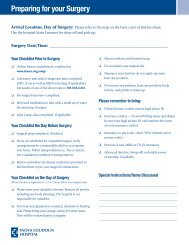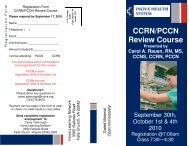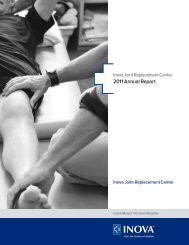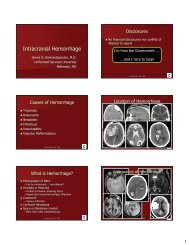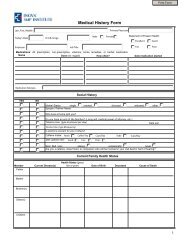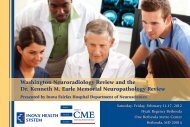Fairfax Hospital Neuroscience Services - Inova Health System
Fairfax Hospital Neuroscience Services - Inova Health System
Fairfax Hospital Neuroscience Services - Inova Health System
You also want an ePaper? Increase the reach of your titles
YUMPU automatically turns print PDFs into web optimized ePapers that Google loves.
Rehabilitation and Recovery<br />
Aphasia<br />
Aphasia means you are having trouble communicating. It may be difficult to talk, understand<br />
speech, read, write, and use numbers when you have aphasia. Aphasia does not change your<br />
intelligence. It just makes it more difficult to share your message with others.<br />
Types of Aphasia<br />
Receptive Aphasia<br />
o You may have trouble understanding what other people say to you. It can be<br />
difficult to follow simple instructions or answer questions with a “yes” or “no”<br />
correctly. You also may have a hard time following conversation. People with this<br />
type of aphasia may also have difficulty with reading.<br />
o This can happen when the area of your brain that helps you understand words and<br />
sentences is damaged after a stroke. This part of your brain is called “Wernicke’s<br />
area.”<br />
Expressive Aphasia<br />
o You may have trouble finding the right word to say at the right time. It can also<br />
feel like you can’t get the word out, and you get stuck. Some people it will happen<br />
only once in a while. For some other people it is difficult to get any words out at<br />
all. People with this type of aphasia may also have difficulty writing.<br />
o This will happen if the area of the brain that produces words and helps form<br />
sentences is damaged after a stroke. This part of your brain is called “Broca’s<br />
area.”<br />
How can I make communicating easier?<br />
Give the patient extra time to speak<br />
Be aware of background noise and turn off radios or TVs while speaking with the patient.<br />
Point to things you are talking about or show pictures if available.<br />
Confirm that you got the message. Ask “yes” and “no” questions to be sure you<br />
understand.<br />
Keep your message short and direct. Try saying, “Do you want lunch”, instead of, “You<br />
had a very busy morning, I’m sure you’ve worked up an appetite. Are you ready for some<br />
lunch?”<br />
If the patient gets stuck on a word, encourage them to try and use a different word that<br />
means the same thing.<br />
Take a break! Getting frustrated or upset will only make it more difficult to speak. It is<br />
ok to take a break until the patient feels ready to try again.<br />
Will my thinking be affected?<br />
Even if you can understand speech and speak well, a stroke may make it difficult to think clearly.<br />
You may find it difficult to remember things or have a hard time solving problems. Some people<br />
become confused easily or have a hard time staying organized. A speech therapist can help you<br />
overcome these things in therapy.<br />
PATIENT INFORMATION GUIDE FOR STROKE<br />
inova.org/neuro





